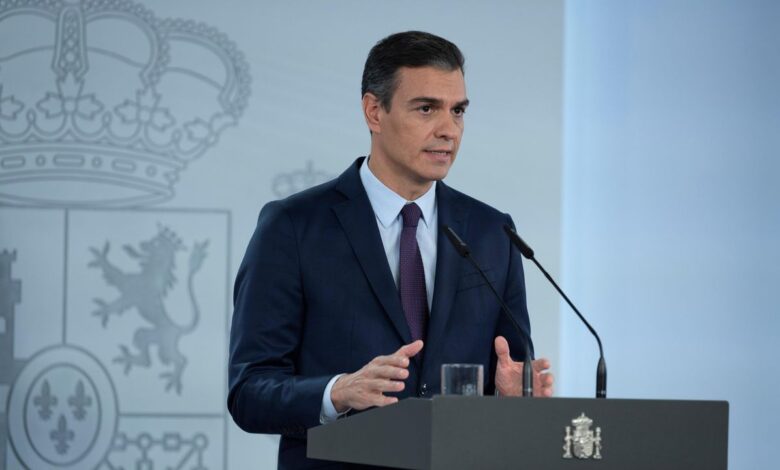https://finanzasdomesticas.com/espana-levanta-estado-de-emergencia

https://finanzasdomesticas.com/espana-levanta-estado-de-emergencia Spain levanta estado de emergencia, which means the state of emergency in Spain is over. This change brings big changes for many people. After more than six months of strict rules and curfews, Spaniards are now free to move about more freely.
People across the country celebrated the end of the emergency measures. However, the COVID-19 virus is still around. The government is now figuring out how to handle the virus without the state of emergency. There are mixed reactions and legal issues as the country adjusts to this new phase.
https://finanzasdomesticas.com/espana-levanta-estado-de-emergencia:What Does “España Levanta Estado de Emergencia” Mean
The phrase “España levanta estado de emergencia” means that Spain has ended its state of emergency. This change means that the special rules put in place because of COVID-19 are no longer needed. For over six months, people in Spain had to follow strict rules, like curfews and travel bans. Now, things are starting to feel more normal.
Ending the state of emergency is a big step for Spain. It allows people to move around more freely and enjoy more activities. However, the COVID-19 virus is still around. So, even though the emergency rules are gone, everyone needs to stay careful and follow new guidelines to stay safe.
Spain’s decision to lift the emergency state has led to many celebrations. People were excited to go out and enjoy their freedom again. The streets and public places were lively as folks made the most of their regained liberties. Yet, the country still faces challenges in managing the virus, and the government is working on new plans to handle this situation.
This change marks an important moment for Spain. It shows progress in handling the pandemic but also reminds everyone that the virus is still a serious issue. New rules and guidelines will help manage the virus while allowing people more freedom.
https://finanzasdomesticas.com/espana-levanta-estado-de-emergencia:Celebrating the End: How Spain’s Freedom Has Changed
With “España levanta estado de emergencia,” Spain has entered a new phase. People all over the country have celebrated the end of long-standing restrictions. After months of curfews and travel bans, Spaniards were thrilled to experience more freedom and enjoy activities they missed.
Many people took to the streets to celebrate their newfound freedom. Cities and towns became lively with celebrations as people relished their ability to go out and about. Public spaces were bustling with activity, and the mood was filled with joy and relief.
Despite the excitement, there are still concerns about COVID-19. The virus hasn’t disappeared, so people need to stay cautious. The government has put in place new plans to handle the virus without the strict emergency rules. Balancing freedom and safety will be important in the coming months.
In summary, the end of the state of emergency in Spain has brought a sense of relief and happiness. While the celebrations are deserved, it’s crucial to remain mindful of the virus and follow any new guidelines to stay safe and healthy.
New Rules After “España Levanta Estado de Emergencia”
When “España levanta estado de emergencia,” Spain introduces new rules to replace the old ones. The end of the state of emergency means that some restrictions are lifted, such as curfews and travel bans. People can now move around more freely, which is a big change from the strict rules that were in place.
The new rules aim to keep people safe while allowing more freedom. Each region in Spain might have different rules based on their COVID-19 situation. Some areas might still have curfews or other restrictions, while others might have fewer limitations. This way, each region can handle the virus in the way that works best for them.
Even though the emergency rules are gone, people still need to follow certain guidelines. These new rules are designed to balance safety with freedom. The government is keeping an eye on the virus and making adjustments as needed. It’s important for everyone to stay informed about the latest rules and follow them to help keep the virus under control.
In conclusion, the new rules after “España levanta estado de emergencia” are meant to provide more freedom while keeping everyone safe. It’s a time of adjustment as the country transitions from strict measures to a new way of managing the pandemic.
https://finanzasdomesticas.com/espana-levanta-estado-de-emergencia:How “España Levanta Estado de Emergencia” Affects Travel
With the end of the state of emergency in Spain, travel rules have changed. People can now move around more freely, which is a big change from the previous restrictions. During the emergency, traveling between regions was limited, and many places had strict rules. Now, Spaniards can travel more easily within their country.
This new freedom means that families can visit each other and go on trips without worrying about travel bans. It also helps businesses that rely on tourism. Travel and tourism are important for Spain’s economy, and the easing of restrictions is a positive step for these industries.
However, even with the end of the state of emergency, there are still safety guidelines to follow. Different regions might have their own rules depending on the local COVID-19 situation. Travelers should stay informed about any local restrictions and follow health advice to keep everyone safe.
In summary, lifting the state of emergency has made travel easier in Spain. While this is great news for many, it’s important to continue following safety guidelines to help prevent the spread of the virus. This new phase allows for more freedom while still focusing on health and safety.
Legal Challenges After Spain Ends the State of Emergency
When Spain lifted the state of emergency, it faced several legal challenges. The end of the emergency measures meant that the country had to find new ways to handle COVID-19 rules. Some regions have their own rules and restrictions, which has led to legal confusion.
For example, in some areas, local courts have allowed restrictions like curfews to stay in place. Other regions have challenged these rules, leading to debates about what measures are needed. The government is working to resolve these issues and make sure that rules are fair and effective.
The legal challenges are important because they help shape how Spain manages the virus. While the state of emergency is over, it’s crucial to have clear rules that everyone can follow. The government is trying to balance freedom with the need to keep people safe.
In conclusion, the end of the state of emergency has brought up legal questions about how to manage COVID-19. These challenges are part of finding the best ways to handle the virus while ensuring that rules are clear and fair for everyone.
https://finanzasdomesticas.com/espana-levanta-estado-de-emergencia:Vaccination Progress and the End of the State of Emergency
The end of the state of emergency in Spain comes at a time when vaccination progress is being made. Many people in Spain have received their COVID-19 vaccines, which is a big part of the country’s strategy to manage the virus. The more people who are vaccinated, the better the chances of controlling the spread of the virus.
As of now, a significant portion of the population has had at least one dose of the vaccine, and many are fully vaccinated. This progress has helped Spain to start easing some of the restrictions that were in place during the pandemic. Vaccination is key to moving towards a more normal life.
Even with the end of the emergency rules, the government encourages everyone to keep following safety guidelines. Vaccines are a crucial tool, but they work best when combined with other measures like wearing masks and practicing social distancing. The goal is to maintain safety while enjoying more freedom.
In summary, Spain’s vaccination efforts are an important factor in ending the state of emergency. As more people get vaccinated, the country can gradually lift restrictions. However, it’s still important to follow health guidelines to keep everyone safe as the situation continues to evolve.
Public Reactions to Ending the State of Emergency
The end of the state of emergency in Spain has led to a variety of public reactions. Many people are excited and relieved to have more freedom after months of strict rules. The lifting of curfews and travel restrictions has allowed people to enjoy activities and visit friends and family more easily.
Public celebrations have been widespread, with people taking to the streets to enjoy their newfound freedom. There is a sense of joy and excitement as people go back to their daily routines. However, some people are also concerned about the ongoing COVID-19 risk.
Not everyone is thrilled with the changes. Some individuals worry that lifting the state of emergency might lead to a rise in COVID-19 cases. They are concerned that the virus is still a threat and that easing restrictions might lead to more infections. Balancing freedom with safety continues to be a topic of discussion.
In conclusion, while many Spaniards are celebrating the end of the state of emergency, there are mixed feelings about the changes. It’s important for everyone to remain vigilant and follow new safety guidelines to ensure that the progress made is maintained.
https://finanzasdomesticas.com/espana-levanta-estado-de-emergencia:The Economic Impact of Ending the State of Emergency in Spain
Ending the state of emergency in Spain has had a significant impact on the economy. For months, businesses and industries faced strict restrictions that limited their operations. With the lifting of these measures, many businesses are starting to recover and get back to normal.
Tourism, which is a major part of Spain’s economy, is seeing improvements as travel restrictions are eased. Tourists can now visit popular destinations without the same level of restrictions, which helps local businesses that rely on tourism. Hotels, restaurants, and other service industries are beginning to see more customers.
However, the economic recovery will not be immediate. Some businesses are still struggling to get back to their pre-pandemic levels of activity. The government is working on supporting these businesses through various programs and incentives. Economic recovery will take time, and not all sectors will bounce back quickly.
In summary, the end of the state of emergency is a positive step for Spain’s economy. It allows businesses to reopen and tourists to return, but a full economic recovery will take time. Ongoing support and adaptation are necessary to help all sectors of the economy get back on track.
Balancing Safety and Freedom After Lifting Restrictions
As Spain lifts its emergency restrictions, finding a balance between safety and freedom is crucial. While the end of the state of emergency allows for more freedom, it’s important to continue taking precautions to keep everyone safe.
Different regions in Spain may have varying rules based on their local COVID-19 situations. Some areas might still have certain restrictions in place, such as mask mandates or social distancing guidelines. These measures help ensure that people can enjoy their freedoms while minimizing the risk of spreading the virus.
The government is focusing on creating guidelines that allow for freedom while maintaining safety. Public health experts are advising on the best practices to follow. It’s important for individuals to stay informed and adhere to these guidelines to protect themselves and others.
In conclusion, balancing safety and freedom is essential as Spain moves forward after ending the state of emergency. By following new guidelines and staying aware of local regulations, people can enjoy their increased freedoms while helping to prevent the spread of COVID-19.
https://finanzasdomesticas.com/espana-levanta-estado-de-emergencia:Regional Differences in COVID-19 Restrictions After the State of Emergency
After Spain ended its state of emergency, different regions are handling COVID-19 restrictions in their own ways. This means that what is allowed in one part of Spain might not be the same in another.
In some regions, local authorities have chosen to keep certain restrictions in place. For example, some areas might have curfews or limits on gatherings to manage the spread of the virus. These decisions are based on the current COVID-19 situation in each region and are meant to protect public health.
Other regions might have fewer restrictions, reflecting a lower level of risk. The variation in rules can be confusing, but it’s important for people to know the specific guidelines for their area. Local authorities are working to provide clear information on what is allowed and what is not.
In summary, regional differences in COVID-19 restrictions reflect the varied situations across Spain. It’s important for people to stay informed about the rules in their own area to ensure they are following the correct guidelines. This approach helps manage the virus while allowing for more freedom.
https://finanzasdomesticas.com/espana-levanta-estado-de-emergencia:The Role of Vaccines in Spain’s Post-Emergency Plans
Vaccines play a crucial role in Spain’s plans after ending the state of emergency. With more people getting vaccinated, Spain is able to ease restrictions and move towards normalcy. Vaccination is a key part of controlling the spread of COVID-19 and ensuring public safety.
As more people receive their vaccines, the risk of severe illness and hospitalizations decreases. This makes it safer for Spain to lift some of the emergency measures that were in place. The vaccination effort is also helping to protect vulnerable populations and reduce the overall impact of the virus.
Even though the state of emergency is over, it’s important for people to continue following health guidelines. Vaccines are a major tool in the fight against COVID-19, but they work best when combined with other preventive measures. The government is encouraging everyone to get vaccinated and to follow any remaining safety guidelines.
In conclusion, vaccines are a vital part of Spain’s strategy after lifting the state of emergency. They help reduce the spread of the virus and allow for more freedoms. Continued adherence to health guidelines will support the ongoing efforts to manage COVID-19 effectively.
Conclusion
Ending the state of emergency in Spain is a big step towards returning to normal life. People are happy to have more freedom after months of strict rules. They can now enjoy activities, travel more freely, and see friends and family without the same restrictions. This change brings a sense of relief and excitement for many.
However, it’s important to remember that COVID-19 is still a concern. Everyone should continue to follow new safety guidelines to keep themselves and others safe. By staying cautious and informed, Spain can balance enjoying more freedom while managing the virus effectively.






